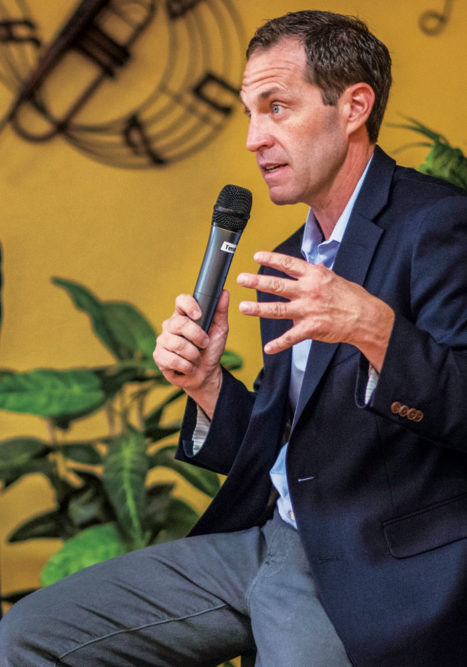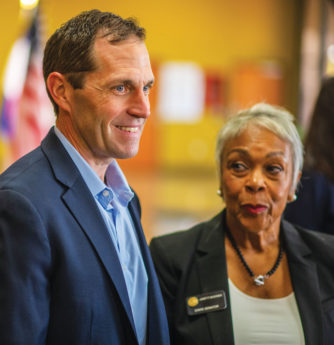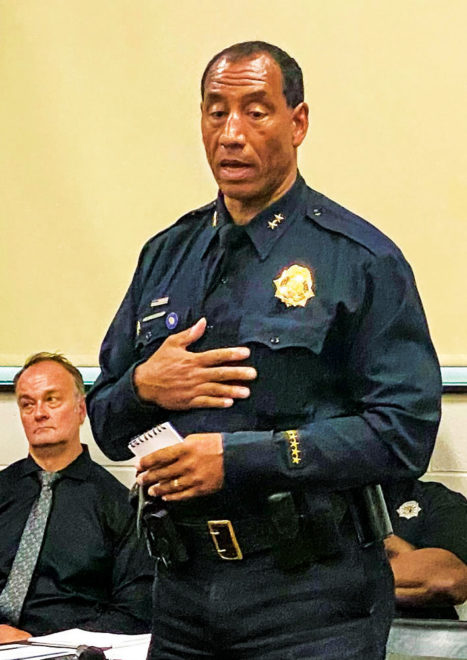
U.S. Rep. Jason Crow speaks during an Oct. event at the Aurora Restoration Christian Fellowship. Guests included African American community leaders and N.Y. Congressman Hakeem Jeffries. Photo by Evan Semon Photography
United States Congressman Jason Crow is the co-sponsor of a bill that would prevent law enforcement officers from needing to respond to calls involving mental health crises. The bill, which was passed by the House, would provide local governments with grants to form mental health units, instead of police, to respond to certain 911 calls.
This would essentially expand nationwide a program that has been successful in Denver. With its STAR program, Denver was one of the first cities to develop a unit of mental health experts that respond to 911 calls involving mental health issues so they can de-escalate situations and provide treatment.
“I’ve been aware of the Denver program dispatching mental health professionals instead of police,” says Rep. Crow. “In Colorado we often lead the way on these things, and so the program proves that this can be implemented and I think we’re a good model to nationalize.”
The data for Denver’s mental health program has been encouraging. One Stanford study demonstrated that over a six-month period, criminal incidents declined by 34-percent in the precincts where STAR was operating.
The Mental Health Justice Act designates $250 million in grants that would be allocated to local governments so all communities can fund the programs, train the staff, and dispatch the units. “I’m very excited for this bill,” says Crow. “We know we have a mental health crisis in America, in our community, and throughout Colorado. The number of suicides and mental health crises have gone up manyfold over the last decade, and local law enforcement is being asked to bear the burden of responding to mental health crisis calls.”

Congressman Crow and State Sen. Janet Buckner mingle with the crowd after the Aurora event.
Photo by Evan Semon Photography
Rep. Crow believes the bill can improve community safety by relieving police of these responsibilities and by offering treatment for the individuals. “Officers are not psychologists or social workers,” says Crow. “Frankly, it’s unfair to place a burden on them that they’re not trained or equipped to handle. So the programs can have our police officers dealing with more serious crimes and public safety issues, and our mental health responders offering better conduits for the individuals to get the resources they need.”
Preventing police brutality is another purpose of this bill. “The numbers show that about 25 percent of police encounters involve individuals with mental illness,” says Rep. Crow. “But when there is an interaction between police and someone with a mental illness, that individual in crisis is 16 times more likely to be killed than when police interact with somebody else.”
The grants could help Denver expand its existing STAR unit and enable communities throughout the nation to create their own mental health programs. “These smaller police departments around the country oftentimes don’t have the resources to grow mental health units,” says Crow. “So the funds can lower the barriers of entry and allow some of these smaller departments to implement the programs.”
The bill still needs to pass through the Senate for the grants to be allocated. “I think there’s bipartisan support in the Senate for the bill, as there was in the House,” says Crow. “We’ll need more bipartisan support in the Senate because of the filibuster. But I hope that between the election and the new Congress we can push this through because it’s an important bill, the country wants it, and our communities deserve it.”
New Denver Police Chief Thomas’ Goals Include Expansion of STAR Program
Ron Thomas was sworn in as the new Denver Police Chief on October 18. The 56-year-old Thomas, who is a life-long Denver resident, has worked with DPD for the past 33 years and is a former commander of Northeast Denver’s District 5 unit. Thomas spoke to Front Porch about the goals he’d like to achieve as the new Police Chief and the strategies he’d like to implement to reduce crime rates.

Denver Police Chief Ron Thomas addressed the residents at the Montbello Recreation Center on Sept 1, just one day after being nominated. Front Porch photo by Christie Gosch
“It’s important to reduce crime because the rates have continued to increase over the last couple of years,” says Chief Thomas. “We especially need to see reductions in homicides and non-fatal shootings because those have the greatest impact on people. Every life is valuable, and we need to do a better job of getting guns off the streets. Then we’re also among the worst cities for auto theft, and that’s more than just a property crime. It’s life-altering because it stops people from being able to get to work, provide for their families, and live their lives.”
The STAR program is high on his list of programs he’d like expanded. “I think using mental health responders is a fantastic idea, so I’m very supportive of STAR and the expansion of STAR,” says Thomas. “Our 911 Center does a great job of identifying those particular calls that don’t need a uniformed law enforcement response because it’s just somebody in crisis. Whether it’s an alcohol-related crisis, a drug addiction-related crisis, or even an adult having a mental health challenge, it’s great to get experts there who can address the acute issue.”
Community relations is also crucial for Chief Thomas. Some residents harbor resentment towards the police due to the many national episodes of officers targeting minority groups and using excessive force. As a result, Thomas is determined to help officers regain the trust of minorities and improve their relationships with communities.
“Residents are often the experts on what is happening and what can be improved in their neighborhoods, so collaborating with them is key,” says Thomas. “But we also have to show our legitimacy because we’re seen by some communities as a force that doesn’t work for them and that may work against them. So through sit-downs and collaborations we need to make sure they understand that we’re not just here to support suburban neighborhoods. We’re also here to support inner city neighborhoods that for a long time have been under-served.”
A new training program can help improve community relations by preventing police brutality. “Every officer is going through an Active Bystandership for Law Enforcement training program so they can learn how to intervene when an officer is out of bounds,” says Chief Thomas. “Law enforcement is a culture where you keep everything inside. So we need to develop a new culture of recognizing beforehand when a partner is having issues or is at the end of his rope, and we want officers to know that the department has resources that can help when they are having those issues.”
Chief Thomas also praises another training program that can reduce the crime rates in the city and maximize the performance levels of his department. “We’ve identified a national best practice model for de-escalation,” says Thomas. “The program enhances the skill and ability to de-escalate any kind of situation, since using this concept we have seen a significant reduction in criminal incidents and use-of-force, and so it’s a win-win situation for our communities.”
Finally, Thomas plans to work more collaboratively with other municipal partners. “Network investigations utilizes partnerships with other city agencies, including the Departments of Transportation and Infrastructure, Parks and Recreation, Economic Development & Opportunity, and Children’s Affairs. These partnerships help reduce crime by addressing deeper problems relating to bad environments or lack of resources.”


0 Comments